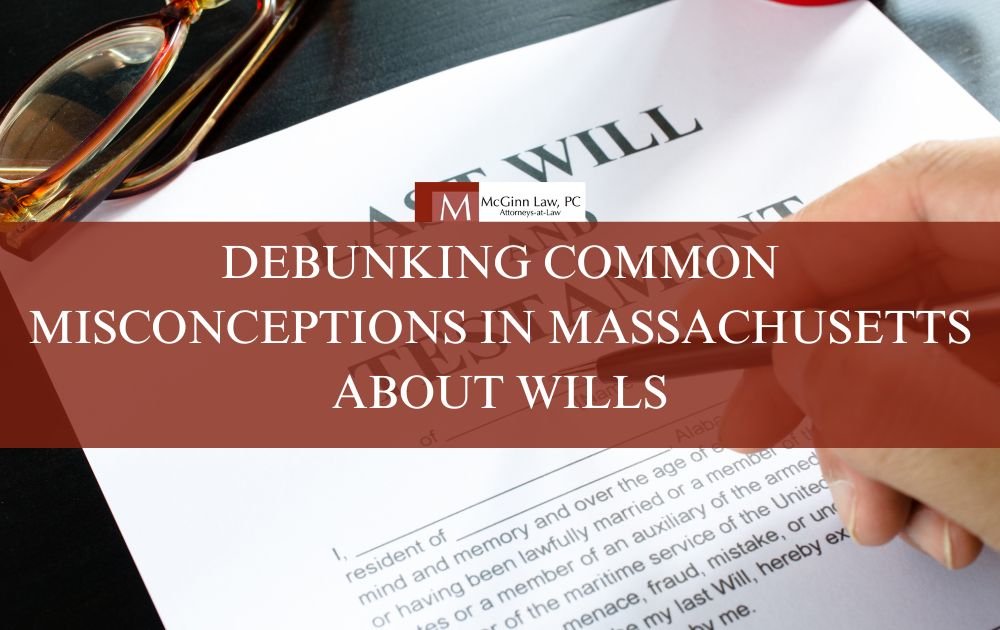
Many common misconceptions in Massachusetts about Wills lead people to misunderstand how they work; unfortunately, many of these misconceptions are incorrect. While the full list of myths related to Wills is too extensive to cover in this brief overview, we will address some of the most prevalent ones.
Common Misconceptions in Massachusetts About Wills
1. "Writing A Will Costs Too Much Money."
Many people believe that writing a will is an expensive process, however it is often not that expensive. Also, in the event of your demise, not having a will may result in costly legal disputes among family members.
2. "Only Wealthy People Need To Write A Will."
It’s a myth that only the wealthy require a will. To make sure their final desires are carried out, anyone with assets or children should think about writing a will.
3. "A Handwritten Will is Enforceable in Court."
A handwritten will only be recognized by a court if it is properly executed by a competent person. Many states, including Massachusetts, require a will to be witnessed by two witnesses and notarized in order to be legally binding, a few states do recognize handwritten wills (sometimes known as “holographic wills”), but you shouldn’t count on that.
4. "You Don't Need To Revise A Will Once You've Written It."
It’s crucial to routinely update your will because your circumstances and wishes may change over time, especially following major life events like marriage, divorce, the birth of a child, or the acquisition of additional assets.
5. "A Will Protects All Of Your Property."
Only assets that are solely in your name at the time of your death are covered by a will.
Any assets (such as retirement accounts and life insurance policies) owned jointly with others or with selected beneficiaries pass to those people directly and may not be impacted by your will.
6. “If Your Family Is Aware Of Your Wishes, You Don't Need A Will.”
You could get a false sense of security if your family knows how you want your belongings handled after you pass away. Without a will, your assets will be dispersed in accordance with the intestate succession laws of Massachusetts, which may be against your wishes.
Without specific instructions in a legitimate and properly executed will, your family and other beneficiaries will be unable to take any alternative distribution steps and will not even be able to make any significant distributions from the estate without a Probate and Family Court order.

7. “Only Those With A Lot Of Property Need Wills.”
Everyone owns some property; hence every person has some type of estate when they pass away. Your loved ones’ lives are made easier when you leave a will with your estate because they have clear instructions about who should handle your affairs and how you want things set up. Every adult ought to possess a simple will.
8. “If You Pass Away Without A Will, Your Spouse Will Inherit Everything.”
Many people believe that when they pass away, their spouse will simply inherit their assets. However, in some states, without a will, the property may be distributed to the spouse and other family members in accordance with a complicated formula.
In Massachusetts, this could happen if the decedent owns assets with business partners or other family members. It can get very complicated very quickly.
9. “Your Loved Ones Can Avoid Probate With A Will.”
A will provides direction, which makes the probate procedure simpler. That does not, however, assist you in avoiding probate because the probate procedure is all about adhering to the terms of the will.
A trust or other methods that remove assets from the estate and allow them to flow directly to your heirs can help you avoid probate. A Revocable Trust can also protect the inherited gift from creditors or beneficiaries who may spend the money too quickly.
10. “For A Will To Be Valid, It Must Be Notarized And Filed With The Court.”
A will in Massachusetts does have to be properly notarized and witnessed, but it does not need to be submitted and filed with the court until after your die; therefore it is easier to change your will later if you choose. Nonetheless, you might wish to speak with a lawyer who can assist in proving the validity (or lack thereof) in court.
11. “My Family Will Look After My Children.”
You don’t want to leave this up to chance. You must include in your will whom you wish to act as guardians for any minor children if you have any. You may also include a trust that puts your assets in trust for your children and appoints a trustee to oversee the money until your children are old enough to manage it themselves.
Creating a revocable trust to protect your children and make the assets available for them immediately is an important step to protecting your family. Without a trust it can take months or even years to free up assets – who is going to pay your mortgage during that time?
12. “You Only Need To Consider Making A Will Once.”
People’s lives frequently change after they make a will, so it is a good idea to periodically evaluate the provisions to make sure the will still manages matters as you intend.
Speak with an estate planning attorney to find out more about how a will can simplify life for both you and your loved ones.
Making a will does not have to be a difficult or expensive process, and it can help family members and friends avoid many potential issues. We cordially encourage you to get in touch with McGinn Law PC at your earliest convenience to discuss drafting or amending your will or other estate planning papers.


